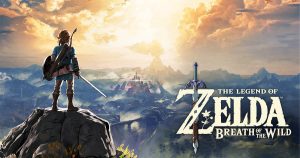(ThyBlackMan.com) Shigeru Miyamoto’s The Legend of Zelda has always been an acclaimed game. In its history there have probably when three games that got zero love and those weren’t on Nintendo consoles. Then you had Zelda II: The Adventure of Link which some were iffy on years later but was still a very, very good Zelda game. I mean, it has features that were good enough to be added to every title in the franchise afterwards. There’s a couple of reasons why The Legend of Zelda is the gold standard in games.
Puzzle Solving
I’m not a big puzzle fan at all. I’ve always hated them because they just slow down the pace of the game if they’re too vast. Like, if you’re not going to make any progress in the game or the story until you solve this multi-part puzzle—meaning you’re going to stay in this area until it’s done—that’s unappealing. That’s busy work.
Zelda has always been big on puzzles. You know, you can’t just cut through these games and not do the main dungeon puzzles at all. Why does it work each time for Zelda and it’s hit or miss for many others? Because Zelda gives you rewards for solving them. Dungeons are going to have puzzles, it’s a fantasy genre trope.
You delve into a dungeon, labyrinth, or ruins and you’re going to find traps and puzzles left by other adventurers or inhabitants. You know what else is a trope with dungeons? Loot. Booty. Treasure. Rewards for tolerating all of that.
Now, Zelda’s rewards are generally minor in nature but help overall. It might be a side weapon or tool that will be useful for a while or heart containers to expand your health. The thing is that you get something for going through these temples and doing the puzzles.
In addition to the series’ puzzles is that they alter the size of them from game to game. Ocarina of Time had pretty meaty puzzles in its dungeons while Breath of the Wild has punchier puzzles to keep your quest going.
That’s good game design.
Exploration
As gaming technology improved, the Zelda games got more and more vast. The peak of this is Breath of the Wild which has different climates and geographical areas in this one area. Freezing mountains, dangerous volcanos, jungles, forests, plains, all kinds of cliffs and hills—running through Hyrule actually seems like an adventure that took a while to tackle.
This is in stark contrast to the first game. Hell, it’s in stark contrast to Ocarina of Time which was set up with the fields in the middle and all different areas on the edges of the field. While each area had different climates and landforms to deal with, the field was barren. You just had the ranch and the fishing area—and the fishing area was pretty much on the edge.
It was like everyone just moved to Hyrule’s castle town and were like “Forget establishing villages. On the plains? The plains? Nah.”
I will say that those games established what open world exploration on consoles could be. They weren’t the most freedom inducing—they were at the time—but several developers note The Legend of Zelda and Ocarina of Time as inspirations. The exploration and openness were two of the factors that went into why they viewed the games so fondly.
If It Ain’t Broke, Don’t Fix It
Each Zelda game is roughly the same adventure that might be told in a different way. If Link doesn’t leave his village, he awakens after a long rest. Time travel might be included. Even so, each time it works. It gets to the point where you don’t even care if the story is familiar, it’s told in a way that it might top the last time it was told.
Zelda sticks firmly in the fantasy realm and that works for it. I mean, I would be interested in a sci-fi Zelda only because I’d like to see how it’s tackled. However, Metroid is Nintendo’s resident sci-fi game series while Zelda holds down fantasy. There’s a system in place and it’s worked for almost 34 years now.
Nintendo is good at making sure that Zelda in particular doesn’t become stale. There’s nothing to worry about too much with Super Mario or Kirby. Especially Kirby since it’s the GOAT. However, Zelda can fall into that trap since the potential to expand it into other genres is there but it never really leaves its confines. Instead, it’s improved upon with each iteration.
That goes a long way in being the gold standard: being able to change the formula but keep the taste that brought you to the dance in the first place.
Staff Writer; M. Swift
This talented writer is also a podcast host, and comic book fan who loves all things old school. One may also find him on Twitter at; metalswift.




















Leave a Reply